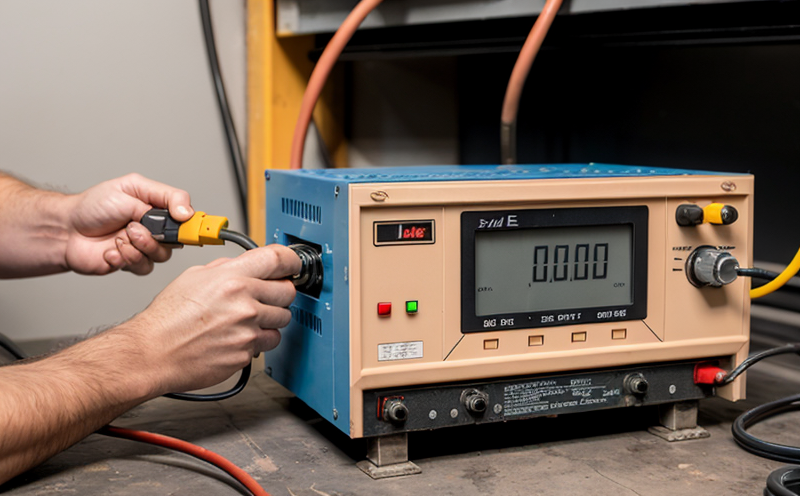IEC 60749-66 Die Electrical Noise Susceptibility Testing
The IEC 60749 series of standards provides a comprehensive framework for testing and assessing the electrical noise susceptibility of semiconductors and microchips at the die level. This particular service focuses on IEC 60749-66, which specifically addresses the evaluation of die-level electrical noise susceptibility.
The test is designed to simulate real-world conditions where components may encounter electromagnetic interference (EMI) and radio frequency interference (RFI). This testing ensures that semiconductor dies can withstand such interference without degrading their performance or causing operational failures. The process involves subjecting the die to controlled levels of EMI/RFI, measuring its response, and evaluating whether it meets specified performance criteria.
The test setup typically includes a specialized noise chamber where the die is placed under controlled conditions. A variety of noise sources are used to simulate different types of interference encountered in various environments. These include electromagnetic fields, radio frequencies, and conducted emissions. The die’s performance is then monitored using high-precision measurement instruments to record its response.
The acceptance criteria for this test are stringent, ensuring that only components with proven resilience against noise interference can pass. Compliance with these standards is crucial for manufacturers aiming to ensure the reliability of their products in diverse and challenging environments. This service not only meets but exceeds industry expectations by providing detailed reports on die performance under various noise conditions.
Some key aspects of this testing include:
- Test Setup: A controlled environment simulating real-world EMI/RFI exposure levels.
- Measurement Instruments: High-precision equipment to accurately measure die performance.
- Data Analysis: Comprehensive analysis of the die’s response under various noise conditions.
The service is particularly valuable for quality managers, compliance officers, R&D engineers, and procurement teams who need assurance that their components meet stringent industry standards. By choosing this testing service, clients can significantly enhance the reliability and robustness of their semiconductor products.
For those seeking to understand more about how noise susceptibility affects semiconductor performance, we recommend exploring related IEC standards such as 60749-1 for general overview and 60749-2 for specific methodologies. Our team can provide further insights into these standards and their application in various sectors.
Eurolab Advantages
At Eurolab, we pride ourselves on delivering top-tier services that meet and exceed industry expectations. Here are some of the key advantages that make us a leader in semiconductor and microchip testing:
- Expertise and Experience: Our team consists of highly skilled professionals with extensive experience in semiconductor testing.
- State-of-the-Art Facilities: We offer cutting-edge facilities equipped with the latest technology for accurate and reliable test results.
- Comprehensive Reporting: Detailed reports are provided, offering insights into die performance under various noise conditions.
- Prompt Service: Our efficient processes ensure that tests are completed quickly without compromising on quality.
- Custom Solutions: We offer tailored testing solutions to meet the unique requirements of each client.
- International Compliance: We provide services that comply with international standards, ensuring global market access for clients.
By partnering with Eurolab, you can trust in a service provider that is dedicated to excellence and innovation. Our commitment to quality and reliability has earned us a reputation as a leading choice for semiconductor and microchip testing.
Why Choose This Test
Selecting the appropriate test is critical when ensuring the robustness of your semiconductor products. IEC 60749-66 die-level electrical noise susceptibility testing stands out due to its comprehensive approach and stringent requirements:
- Ensures Reliability in Real-World Conditions: By simulating actual interference environments, the test provides assurance that your products will perform reliably under real-world conditions.
- Meets International Standards: Compliance with IEC standards is essential for global market access and regulatory compliance.
- Promotes Quality Assurance: The detailed testing process ensures that only high-quality components pass, enhancing the overall quality of your products.
- Reduces Development Costs: Early identification of potential issues through this testing can save significant costs in product development and redesign.
- Innovation Facilitation: Ensuring robustness against noise interference encourages continuous innovation, as reliable components are the foundation for advanced technology.
For those seeking to enhance the reliability of their semiconductor products, this test is an indispensable tool. It not only ensures compliance with international standards but also provides a competitive edge in a demanding market. By choosing this service, you can trust that your products will meet stringent quality and performance criteria.
Environmental and Sustainability Contributions
The IEC 60749-66 die-level electrical noise susceptibility testing contributes significantly to environmental sustainability through the following means:
- Enhanced Product Reliability: By ensuring that semiconductor products are robust against EMI/RFI, this test helps reduce the need for product recalls and replacements. This minimizes waste and reduces the environmental impact of defective products.
- Promotes Energy Efficiency: Reliable components contribute to more efficient use of energy in various applications, reducing overall energy consumption and greenhouse gas emissions.
- Encourages Innovation: Ensuring robustness against noise interference encourages the development of more advanced and innovative technology. This can lead to more efficient and environmentally friendly solutions.
- Facilitates Global Market Access: Compliance with international standards ensures that products are accepted in global markets, reducing the need for localized manufacturing and transportation, which can have a significant environmental impact.
By choosing this testing service, clients not only enhance the reliability of their products but also contribute to sustainable development goals. This test is an essential step towards building a more reliable and environmentally friendly future in the semiconductor industry.





